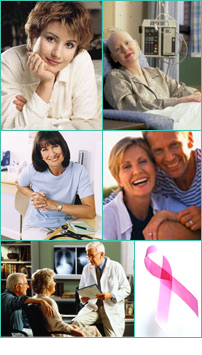 |

 |
Categories of Q&A |
 |
| The magazine on: |
- Women's health
- Breast health
- Breast cancer
|
Read  for free. for free.
Click here. |
|
|
|
 |
|
|
 |
 |
Side Effects of Chemotherapy |
|
 |
|
|
| What are the side effects of chemotherapy? |
Chemotherapy (i.e., the use of chemo drugs) can be a very effective part of the treatment of breast cancer. Depending on the kinds and doses of the chemotherapy drugs used, however, patients may experience different types of side effects, including:
• Some temporary side effects (called acute side effects) during treatment
• Some longer lasting side effects (called chronic side effects)
• Some permanent side effects
Chemotherapy drugs work by targeting cells that divide rapidly. However, cancer cells are not the only cells that divide rapidly. Normal cells in the bone marrow, lining the digestive tract, and in the hair follicles also divide rapidly. Unfortunately, these healthy cells also may be affected by the chemotherapy drugs.
For example, one of the potential kinds of side effects of certain types of chemotherapy drugs is the impact on blood cell counts (i.e., numbers of cells in the blood). Chemotherapy can reduce the function of the bone marrow, where most blood cells are produced.
Some cancer patients may experience one or more of the following types of side effects during the treatment:
• Fatigue
• Anemia (low level of red blood cells)
• Neutropenia (low level of white blood cells)
• Infections due to neutropenia
• Thrombocytopenia (low level of platelets, cells that are involved in the clotting of blood)
• Bruising and bleeding due to thrombocytopenia
• Numbness and tingling
• Pain
• Unclear thinking & lack of ability to concentrate. (These side effects have been termed "chemo brain.")
• Hair loss
• Mouth sores
• Nausea and vomiting
• Constipation
• Diarrhea
• Loss of sex drive
• Other side effects on the reproductive system
Be sure to tell your oncologist if you are experiencing any of these side effects during chemotherapy. Various medicines and other therapies are available to minimize and manage many of these side effects of chemotherapy. See our Q&As on the specific side effect and its management and treatment.
Most of these side effects of chemotherapy usually go away during the recovery period portion of the chemotherapy cycle or after all of the chemotherapy treatment has been completed. Consult your oncologist if you are experiencing any of these side effects during the recovery period part of the chemotherapy cycle or after all of the chemotherapy treatment has been completed. Various types of medications and other forms of therapy are available for management of side effects that persist past the completion of chemotherapy.
|
|
|
|
 |


